Hair breakage is one of the most common hair concerns affecting individuals across all ages and genders. Whether it’s due to environmental stressors, harsh hair practices, or underlying health issues, understanding the root cause is essential for effective treatment. That’s where the expertise of a professional trichologist becomes crucial. A Best Trichologist In Dubai specializes in diagnosing and addressing scalp and hair disorders with a scientifically backed, holistic approach.
What is Hair Breakage?
Hair breakage refers to the snapping or splitting of hair strands before they reach their full length. Unlike hair fall, which involves shedding from the root, breakage occurs along the shaft, making the hair appear thinner and shorter.
Points:
- Breakage leads to stunted hair growth.
- It occurs when hair becomes weak due to damage or stress.
- It often leads to uneven hair length and frizzy texture.
Common Causes of Hair Breakage
Understanding the causes is vital to formulating the right treatment plan.
Environmental Stressors
Sun exposure, pollution, and humidity can strip hair of its natural moisture, making it brittle.
Over-Styling
Frequent use of heat tools, chemical treatments, or tight hairstyles weakens hair integrity.
Nutritional Deficiencies
Lack of essential vitamins and minerals like biotin, zinc, and protein affects hair strength.
Poor Hair Care Routine
Using harsh shampoos or brushing hair when wet can increase breakage rates.
Health Conditions
Hormonal imbalances, thyroid issues, and certain medications can contribute to brittle hair.
Scalp Health:
Hair breakage often stems from an unhealthy scalp. The scalp serves as the base where follicles grow, and its condition directly affects hair strength.
Factors:
- Sebum production (natural oil balance)
- Presence of dandruff or infections
- Blood circulation to the scalp
Customized Hair Regimens
No two individuals experience the same type of hair breakage. A tailored plan ensures that specific issues are addressed effectively.
Common elements of a customized plan:
- Mild, sulfate-free shampoos
- Protein-rich conditioners
- Leave-in serums or oils with nourishing ingredients
- Weekly scalp massages or detox masks
Addressing Stress and Hormonal Factors
Stress-induced breakage is common but often overlooked. Trichologists recognize the role of mental health and hormonal balance in hair issues.
Role of Topical Treatments and Technologies
Modern trichology incorporates advanced tools and treatments that enhance hair repair and regrowth.
Popular interventions:
- Low-Level Laser Therapy (LLLT)
- Scalp Microneedling
- Platelet-Rich Plasma (PRP) therapy
- Stem cell activator serums
Educating Clients on Prevention
One of the cornerstones of trichology is prevention. Trichologists educate clients about best practices to avoid future breakage.
Preventive strategies include:
- Avoiding frequent heat styling
- Using silk pillowcases
- Regular trimming of split ends
- Protective hairstyles for sleeping or outdoor activities
Common Hair Breakage Causes vs. Trichologist Solutions
| Cause | Trichologist’s Approach |
|---|---|
| Heat Styling Damage | Recommend heat protectants, limit usage |
| Nutritional Deficiencies | Diet modification and supplementation |
| Hormonal Imbalance | Referral for hormone testing |
| Chemical Processing | Restorative masks and break from treatments |
| Poor Scalp Health | Scalp detox and balancing oils |
| Mechanical Damage (combing) | Restorative masks and a break from treatments |
FAQ’s
1. How is hair breakage different from hair loss?
Hair breakage occurs along the strand due to damage, while hair loss typically involves shedding from the root. Trichologists treat them differently depending on the underlying cause.
2. Can natural remedies stop hair breakage?
While natural oils like coconut or argan oil may help reduce friction and hydrate strands, professional treatment is often required for chronic or severe breakage.
3. Is it safe to use protein treatments regularly?
Protein strengthens hair, but overuse can lead to stiffness and further breakage. A trichologist balances moisture and protein in treatment plans.
4. How often should I get a scalp analysis?
For ongoing concerns like breakage, quarterly scalp analyses are ideal. It helps track progress and adjust care routines as necessary.
5. Can stress alone cause hair breakage?
Yes, chronic stress can disrupt the hair growth cycle, reduce blood flow to follicles, and lead to weaker hair strands that are prone to snapping.
 WhatsApp Us Now
WhatsApp Us Now







